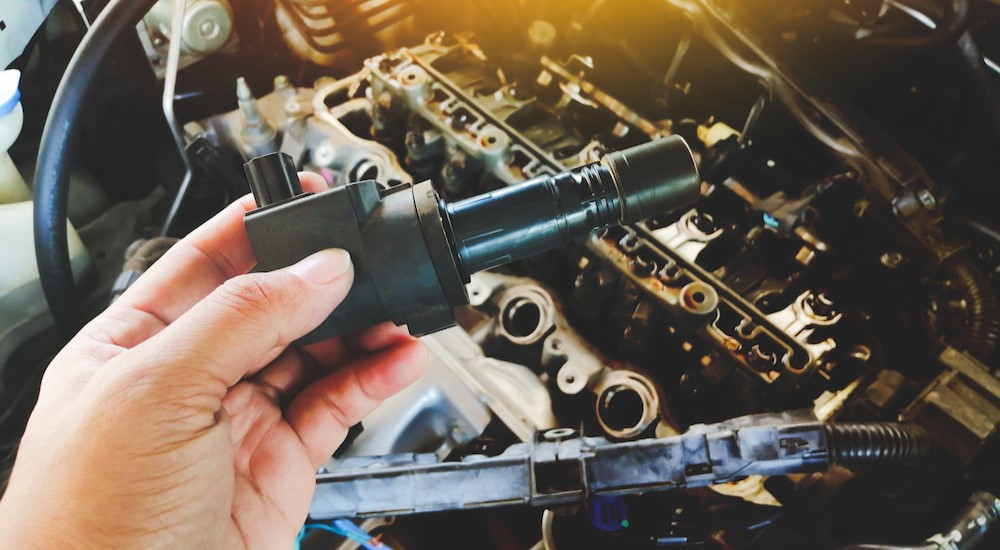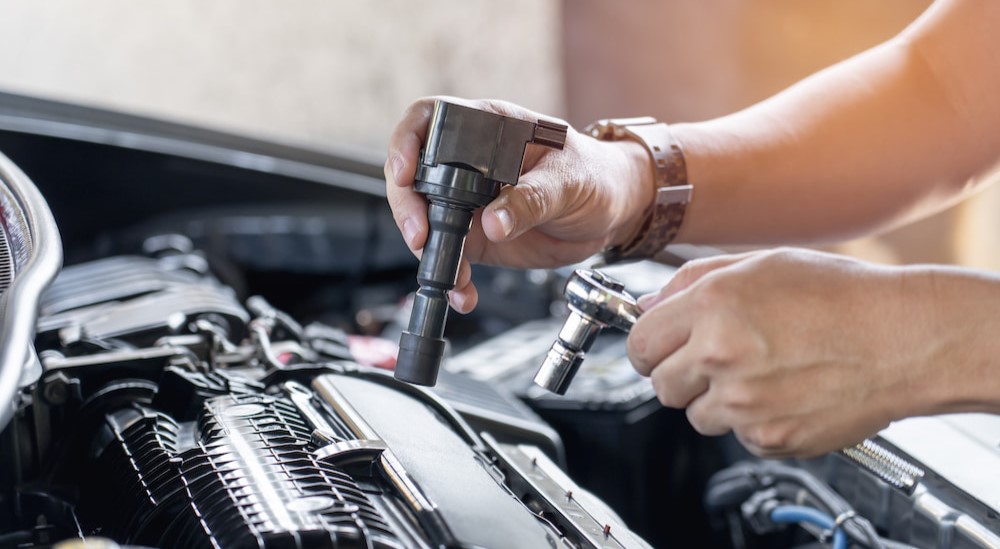The ignition coils aren’t the first, second, or even third component most people think of when it comes to car engines; however, they are a crucial component for making your vehicle start and run. When an ignition coil wears out or fails, the engine is going to run rough—or it may not run at all, which could entail an extended stay at an auto repair shop as technicians diagnose and fix the issue.
Understanding this obscure component will help you stay on top of maintenance and quickly identify potential problems, saving you time, money, and mental energy. Our overview has everything you need to know about ignition coils, including their purpose in the engine, reasons for possible failure, and the indicators that a coil needs to be replaced.
How an Ignition Coil Works
Gasoline engines are powered by combusting oxygen and fuel vapor under pressure. Your spark plugs provide the ignition to burn the air and fuel, but they can require up to 40,000 volts of electricity—far more than the 12-volt battery that is standard in most vehicles.
The ignition coil is what “steps up” the battery voltage to something the spark plugs can use. Each coil has a copper winding that uses induction to create an electromagnetic field. When a special transformer known as a coil pack opens and closes the circuit, it collapses the magnetic field, which causes temporary voltage surges. The coil captures these surges and delivers them to the spark plugs while coordinating with the cylinder cycle so the air/fuel mixture ignites properly.
Vehicles made before the 1990s usually had a single ignition coil with a distributor that split power between the spark plugs and sent it at the correct intervals. However, the rise of electronic ignition systems led to the coil-on-plug (COP) setup that almost all modern vehicles use. In this design, each spark plug has an ignition coil sitting directly on it, and electronic sensors take care of the voltage timing. The COP design is more powerful, accurate, and reliable than a single coil and distributor. (Let’s note that diesel engines don’t use ignition coils because, in their case, heat and compression alone are enough to ignite the air and fuel.)
How Long Do Ignition Coils Last?
Depending on the vehicle, COP ignition coils can be expected to last between 80,000 and 100,000 miles. Wear and tear will eventually occur as it does with every part, and the coil’s insulation will deteriorate over time. Check your vehicle manual for the recommended maintenance schedule. Several factors impact the lifespan of ignition coils, including how old your vehicle is, how hard you drive, how well the coils are made, and how often you drive in extreme temperatures.

Why an Ignition Coil Might Fail
Beyond maintenance and driving habits, there are several reasons an ignition coil can stop working prematurely. One is if the air/fuel ratio in the engine is off, which can happen for reasons such as a bad oxygen sensor, leaky fuel injector, or clogged air filter. Whatever the cause, a ratio that is too rich or too lean causes spark plug issues (like early wear, carbon deposits, etcetera) that eventually lead to the ignition coils degrading.
On a related note, how well you keep up with spark plug maintenance can also affect your coils. Spark plugs have a shelf life, too, and not replacing them on time will force the ignition coils to work harder and thus wear out sooner. This is because the gap between the spark plug electrodes widens over time, requiring more and more voltage that eventually leads to a short circuit. If you’re using spark plugs that weren’t properly gapped to begin with, that aggravates the problem.
Other common causes of ignition coil failure include an overheating engine, valve oil leaks, excessive vibrations, water getting into the spark plugs, and bad wiring. A weak battery can put a strain on the ignition coils, and we’ve even heard of rodents eating the coil insulation! It’s worth noting that, many times when the ignition coil goes bad early, it’s a side effect of another issue, so a thorough engine investigation may be in order.
Finally, there’s the possibility that the ignition coils in the car just aren’t very good. In 2021, Subaru of America recalled more than 460,000 vehicles because of concerns about the coils degrading too fast. You also must watch out when getting replacement coils so you don’t end up with an inferior part.
Signs of a Bad Ignition Coil
The sooner you can diagnose an ignition coil problem, the sooner you can get the part replaced before it leads to more problems. Here are eight common signs of a faulty ignition coil:
- Your vehicle has trouble starting, especially in cold weather.
- The engine frequently stalls, misfires, or backfires.
- The engine runs rough when idling.
- The vehicle is slow to accelerate or does so in a herky-jerky way.
- You experience an overall loss of power.
- Your fuel mileage drops significantly. (This is because the car burns more gas to make up for the lack of voltage.)
- The engine makes coughing, spluttering, or banging sounds.
- The ‘check engine’ light comes on with an ignition coil diagnostic code.
In the case of a trouble code, you may be able to diagnose which coil is bad using an OBD II scan tool. See where the initial diagnostic code is located, then move the coil in question between cylinders to check if the code moves, too. (Remember to disconnect the negative battery terminal before touching any coils!)

What Should I Do If I Have a Bad Ignition Coil?
If you have one or more signs of a bad coil, schedule a service appointment as soon as possible and avoid driving in the meantime. Though you might be able to technically drive the vehicle with a bad coil, the problems it causes can make doing so unsafe and potentially cause further damage.
Depending on the vehicle, the coil configuration, and where you’re located, RepairPal estimates that it will cost between $213 and $295 to replace a single ignition coil; this includes parts and labor. However, as mentioned, other problems are often at the root of an untimely ignition coil failure, so you should brace yourself for additional repairs and related fees.
How to Make an Ignition Coil Last Longer
Although an ignition coil won’t last forever, there are some things you can do to get the most life from them:
- Keep on track with scheduled maintenance, especially oil and filter changes, tune-ups, and battery replacements.
- Regularly inspect the coils and the rest of the ignition system for debris and damage.
- Use OEM ignition coils or approved replacements to ensure the highest quality.
- Clean the engine periodically to help it run cooler.
- Limit your driving in extremely hot or cold temperatures, and go easy on your vehicle when you do.
- If any other issues come up, such as bad sensors or vibrations, address them immediately.
Avoid Coil Turmoil
Having working ignition coils is necessary in a gasoline-powered vehicle. Without the high voltage they provide, even the most powerful V8 supercar won’t outrun an everyday lawnmower. Keep your eyes and ears out for potential trouble with your ignition coils, especially on higher-mileage vehicles, and remember the factors that can lead to them failing. Simply being aware of this important component today can spare you a lot of trouble tomorrow.

